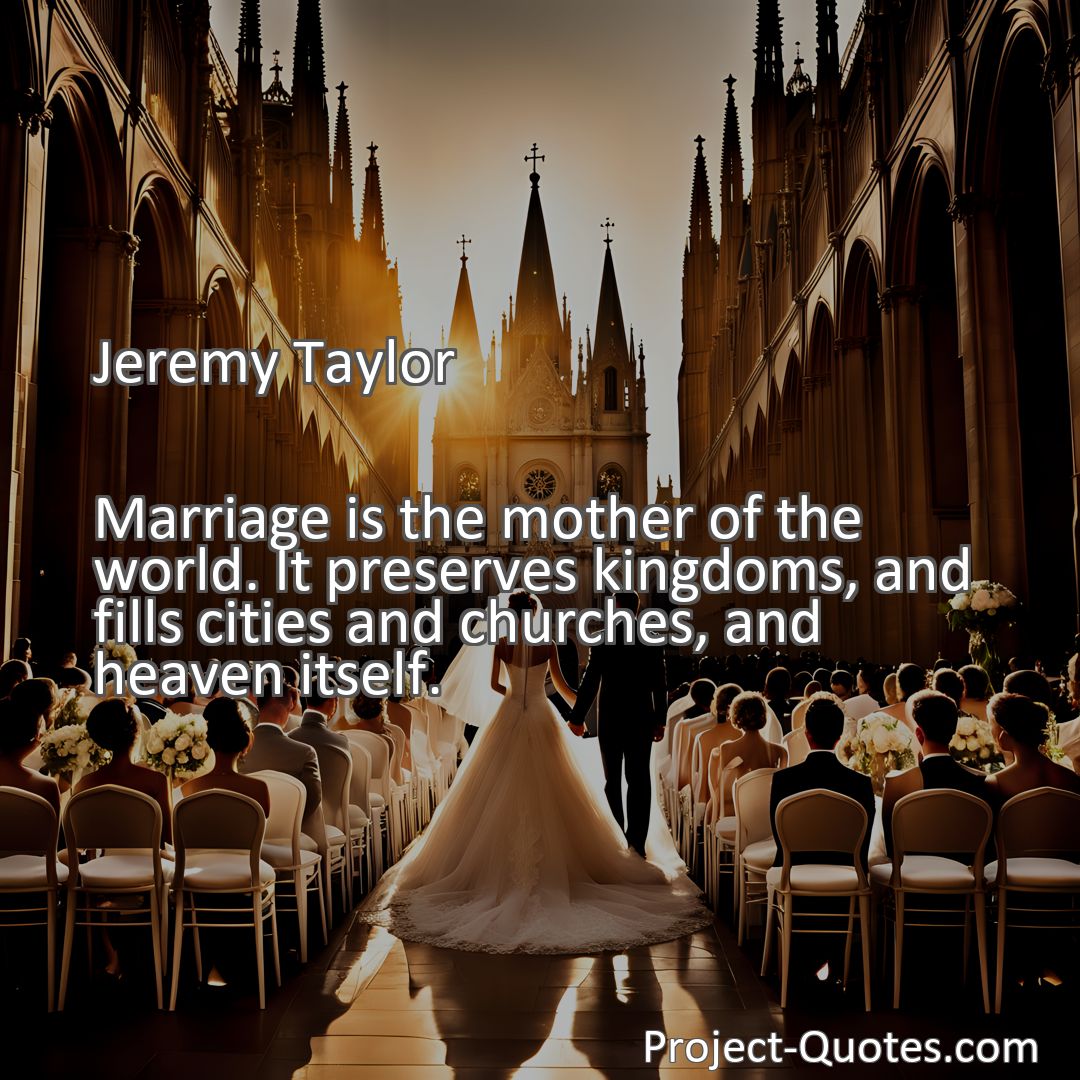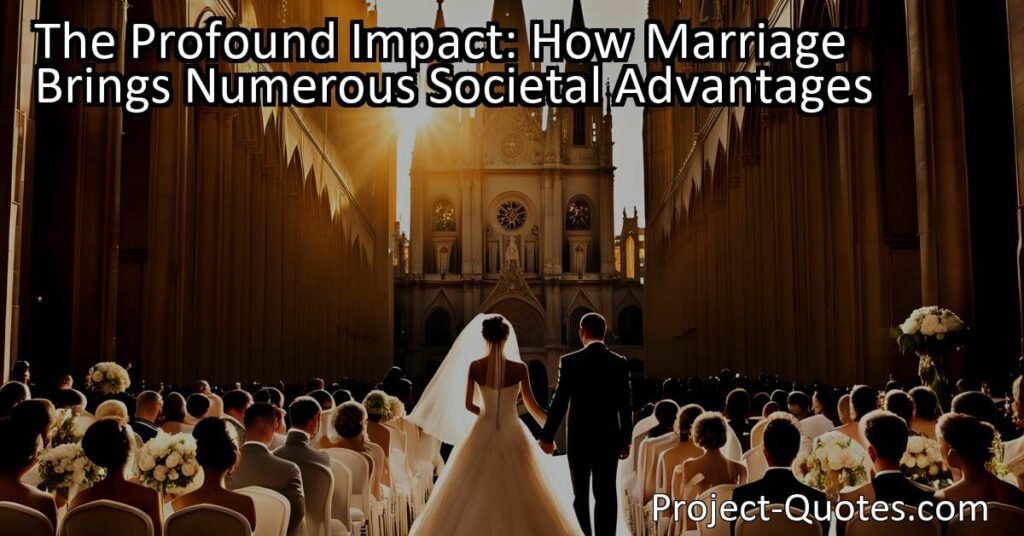Marriage is the mother of the world. It preserves kingdoms, and fills cities and churches, and heaven itself.
Jeremy Taylor
Marriage also brings numerous societal advantages, including increased emotional well-being, physical health, and financial stability. It plays a crucial role in raising and nurturing the next generation, providing a secure and loving environment for children to grow. Additionally, marriage serves as a catalyst for social cohesion and integration, bringing together diverse cultures and promoting understanding and tolerance.
Table of Contents
Meaning of Quote – Marriage is the mother of the world. It preserves kingdoms, and fills cities and churches, and heaven itself.
Marriage is often described as one of the oldest and most fundamental institutions in human society. This sacred union between two individuals has been celebrated, honored, and revered across cultures and centuries. Jeremy Taylor, an influential theologian and writer of the 17th century, eloquently captures the essence of marriage in his quote: “Marriage is the mother of the world. It preserves kingdoms, and fills cities and churches, and heaven itself.” Although this particular quote may seem enigmatic, upon closer analysis, we can unearth profound implications regarding the significance and impact of marriage on various aspects of life.
To fully comprehend the depth of Taylor’s words, it is essential to understand the historical context in which he wrote. During the 17th century, marriage played a crucial role in maintaining social order and stability. It was a means of cementing alliances between powerful families, ensuring the continuity of wealth and power. Hence, when Taylor refers to marriage as “the mother of the world,” he implies that it is the very foundation upon which society thrives.
One can argue that marriage functions as a cornerstone for stability within kingdoms. By forming marital bonds, families create connections that transcend the individual, weaving their destinies and fortunes together. Through marriages, kingdoms are preserved as bloodlines are continued, ensuring the succession of power and lineage. These marital alliances represent a form of social contract that maintains balance and unity within ruling families, eliminating potential for discord and ensuring the smooth functioning of a kingdom.
Furthermore, Taylor suggests that marriage not only preserves kingdoms but also fills cities and churches. This perspective underscores the idea that marriage serves as the driving force behind urbanization and religious devotion. When individuals come together in matrimony, they generate families, expanding the population of cities. Families, in turn, contribute to the growth and development of urban areas, fostering vibrant communities and cultural diversity.
Marriage also occupies a central role within religious institutions. Churches, synagogues, mosques, and temples have long recognized the significance of marriage as a religious sacrament. The act of joining two individuals together in holy matrimony is often considered a divine union, blessed and sanctified by a higher power. As such, marriages are celebrated within religious communities and provide the foundation for fostering faith, spirituality, and the perpetuation of religious traditions.
Expanding on Taylor’s assertion, we can even consider the celestial implications of marriage. He boldly states that marriage fills heaven itself. This perspective suggests that the transformative power of marriage extends beyond earthly matters and into the realm of the divine. In various religious beliefs, marriage is seen as a sacred bond that transcends mortal existence, leading to eternal union and bliss in the afterlife.
When contemplating Taylor’s quote, it is important to note that his perspective arose from the cultural and social norms of his time. Historical contexts shape our perception of marriage and influence the way in which we view its impact on the world. Over the centuries, societal attitudes towards marriage have evolved, reflecting changing values, gender dynamics, and legal frameworks.
In modern times, marriage continues to hold immense significance in the lives of many individuals. While its role may have shifted in some respects, marriage remains a fundamental pillar of society. It serves as a celebration of love, commitment, and partnership between two people, regardless of their gender or religious background. By legalizing and recognizing these unions, societies acknowledge the importance of stability, commitment, and the building of families.
In addition to the personal benefits, marriage also brings numerous societal advantages. Research has consistently indicated that married individuals tend to exhibit increased emotional well-being, physical health, and financial stability. Consequently, the institution of marriage contributes to the overall well-being of communities by fostering healthier and more prosperous individuals.
Marriage also plays a crucial role in raising and nurturing the next generation. The union of two individuals brings forth the creation of families, providing a secure and loving environment for children to grow and flourish. The stability and support offered by married parents are essential for the healthy development of young minds, imparting valuable life lessons and shaping the values and morals of future generations.
Moreover, marriage serves as a catalyst for social cohesion and integration. It is through marriage that diverse cultures, ethnicities, and religions intersect, leading to greater understanding and tolerance between different groups. When individuals from varying backgrounds come together in matrimony, families become microcosms of a harmonious and multicultural society.
While marriage undoubtedly holds significant benefits, it is important to acknowledge that not all unions thrive or last. Divorce rates have risen in recent decades, prompting scrutiny and analysis of the institution itself. However, it is crucial to recognize that divorce does not diminish the profound impact that successful marriages have on individuals and society as a whole. The possibility of divorce should not deter individuals from entering into marriages, but rather highlight the importance of investing in healthy relationships and promoting effective communication and conflict resolution skills.
In conclusion, Jeremy Taylor’s quote encapsulates the timeless significance of marriage in human civilization. From preserving kingdoms and filling cities and churches to resonating even in the celestial realm, marriage truly stands as an institution of immense power and influence. Through the enduring commitment between two individuals, marriage continues to shape the world, fostering stability, happiness, and growth in both personal and societal dimensions. As we continue to navigate societal changes, it is vital to recognize and cherish the everlasting spirit of partnership and love that marriage embodies.
I hope this quote inspired image brings you hope and peace. Share it with someone who needs it today!


